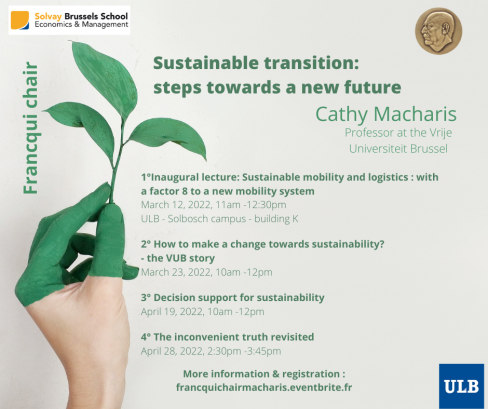
The Francqui Chair conference continues. After Cathy Macharis' inaugural conference on Sustainable Mobility and Logistics and her presentation on Sustainability in Education as part of the launch of the Ernest Learning Lab, Cathy will talk about 'Decision Support for Sustainability' on April 19 and the role of emotions and intentions in her talk on 'The inconvenient truth revisited' on April 28.
-
Decision support for sustainability
-
April 19, 10-12pm
-
Room DC2.206
-
Contact: Evelyne.Vanpoucke@ulb.be
-
In striving towards sustainability, complex situations require the right decisions to achieve certain, often long-term, targets. We are speaking about products, processes and various other activities that are subject of any assessment with the aim to achieve a decision that contributes positively to sustainable development. A decision process itself can show complexity as it consists of several phases - elicitation, evaluation and ensuring - and mostly includes various stakeholders with different views and objectives. In this lecture we will give an overview of methods and tools that can help to support decision-making for a more sustainable world. These can be 'hard' methods which are mostly quantitative and directly applicable or 'soft' methods which are rather qualitative or a mix of both and can serve as guidance mainly throughout the elicitation of a decision process.
-
The inconvenient truth revisited - RSAEM seminar
-
April 28, 2:30-3:45pm
-
Contact: Claudia.Toma@ulb.be
-
Scientific research is very much oriented towards what can be seen, observed, measured to distinguish the truth. But next to this traditional knowledge there are other forms of knowledge such as the intuitive and instinctive ones. The most important aspects of reality, that what comes before the material things, are not enough taken into account, namely our feelings and intentions, hope, insecurity, etc. They are all fundamentally unmeasurable. While the earth is warming, and we know it to be true, we do not manage to act according to it. In this lecture Cathy Macharis argues that we need to go beyond what is measurable to make a change. Can we come to an alignment of scientific knowledge and that what touches people?
